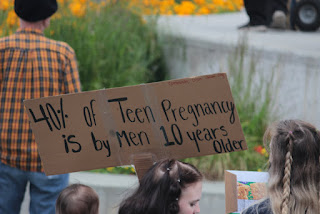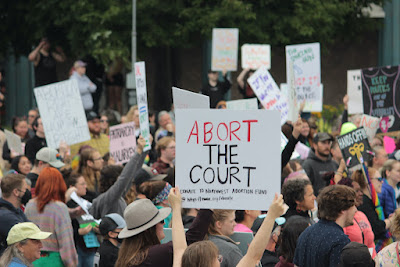This afternoon, people gathered at the Parkstrip and marched to the Anchorage Town Square to protest Friday's Supreme Court decision on abortion. My rough estimate of the crowd is 400-600.
Observations: The crowd was younger than the demonstration on May 8, 2022 when the decision was leaked. The organizers also talked a lot about voting this time, which was missing at the previous demonstration. Including voting no on whether Alaska should have a constitutional convention. (The constitution requires such a vote every ten years.) Conservatives want such a convention to do (at least) two things:
- Remove the right to privacy in the constitution
- Change how judges are selected in Alaska (by a non-partisan commission which evaluates people applying for judgeships by reviewing surveys of judges, attorneys, juries, court employees, and court watchers. Top candidates are passed on to the Governor to choose from.
During the 1960's the protesting against the Vietnam war was invigorated by the fact that all 18 year old men had to register for the draft and stood a decent chance of being sent to Vietnam to fight. All their friends and family had a very personal interest in the war ending.
Today's young folks have been give an equally important stake in fighting Dobbs v. Jackson's Women's Health Organization. This time it's all women of child bearing age who are on the line, but since women don't need an abortion unless a man has been involved, men too have a vital stake. And if the Vietnam War protests are any predictor, the people fighting to make abortions legal again aren't going away.
Here are some photos from today's protest.
Facts of the caseCarrie Buck was a "feeble minded woman" who was committed to a state mental institution. Her condition had been present in her family for the last three generations. A Virginia law allowed for the sexual sterilization of inmates of institutions to promote the "health of the patient and the welfare of society." Before the procedure could be performed, however, a hearing was required to determine whether or not the operation was a wise thing to do.QuestionDid the Virginia statute which authorized sterilization deny Buck the right to due process of the law and the equal protection of the laws as protected by the Fourteenth Amendment?ConclusionThe Court found that the statute did not violate the Constitution. Justice Holmes made clear that Buck's challenge was not upon the medical procedure involved but on the process of the substantive law. Since sterilization could not occur until a proper hearing had occurred (at which the patient and a guardian could be present) and after the Circuit Court of the County and the Supreme Court of Appeals had reviewed the case, if so requested by the patient. Only after "months of observation" could the operation take place. That was enough to satisfy the Court that there was no Constitutional violation. Citing the best interests of the state, Justice Holmes affirmed the value of a law like Virginia's in order to prevent the nation from "being swamped with incompetence . . . Three generations of imbeciles are enough."
Griswold v. Connecticut, 381 U.S. 479 (1965)
Argued March 29-30, 1965
Decided June 7, 1965
Syllabus
Appellants, the Executive Director of the Planned Parenthood League of Connecticut, and its medical director, a licensed physician, were convicted as accessories for giving married persons information and medical advice on how to prevent conception and, following examination, prescribing a contraceptive device or material for the wife's use. A Connecticut statute makes it a crime for any person to use any drug or article to prevent conception. Appellants claimed that the accessory statute, as applied, violated the Fourteenth Amendment. An intermediate appellate court and the State's highest court affirmed the judgment.
Held:
1. Appellants have standing to assert the constitutional rights of the married people. Tileston v. Ullman, 318 U. S. 44, distinguished. P. 381 U. S. 481.
2. The Connecticut statute forbidding use of contraceptives violates the right of marital privacy which is within the penumbra of specific guarantees of the Bill of Rights. Pp. 381 U. S. 481-486.
DECIDED Mar 22, 1972
Facts of the case
William Baird gave away Emko Vaginal Foam to a woman following his Boston University lecture on birth control and over-population. Massachusetts charged Baird with a felony, to distribute contraceptives to unmarried men or women. Under the law, only married couples could obtain contraceptives; only registered doctors or pharmacists could provide them. Baird was not an authorized distributor of contraceptives.
Question
Did the Massachusetts law violate the right to privacy acknowledged in Griswold v. Connecticut and protected from state intrusion by the Fourteenth Amendment?
Conclusion
6–1 DECISION
MAJORITY OPINION BY WILLIAM J. BRENNAN, JR.
In a 6-to-1 decision, the Court struck down the Massachusetts law but not on privacy grounds. The Court held that the law's distinction between single and married individuals failed to satisfy the "rational basis test" of the Fourteenth Amendment's Equal Protection Clause. Married couples were entitled to contraception under the Court's Griswold decision. Withholding that right to single persons without a rational basis proved the fatal flaw. Thus, the Court did not have to rely on Griswold to invalidate the Massachusetts statute. "If the right of privacy means anything, wrote Justice William J. Brennan, Jr. for the majority, "it is the right of the individual, married or single, to be free from unwarranted governmental intrusion into matters so fundamentally affecting a person as the decision whether to bear or beget a child."











'During the 1960's the protesting against the Vietnam war was invigorated by the fact that all 18 year old men had to register for the draft and stood a decent chance of being sent to Vietnam to fight. '
ReplyDeleteNot true Steve, I graduated HS in 1969 in June. July I got the notice that I was 1-A and August I was called for my physical. This is while most of my friends who were going to college got a student deferment. The decent chance came after the draft lottery in 1969 when everyone one was treated equal and the privileged class was treated like everyone else. You get a student deferment?
This sounds like something Oliver would write. Excuse me if I’m wrong.
DeleteI wrote “all” men had to register for the draft. That was true. I should have then written ‘most’ stood a good chance of being drafted.
The rules changed as the war ramped up as you note with the introduction of the lottery. But even so, most men were liable to be drafted, though it depended in part on their draft board quotas. Here’s from a Census report: “The proportion of the adults who had completed one or more years of college was 21 percent in 1970 . . . “
Since the vast majority of men in 1970 (79%) didn’t have one or more year of college, they were eligible to be drafted. But college students were eligible to be drafted once they graduated. And in 1966 college students had to take a test and get a good enough score to keep their deferment.
So the vast majority of US men had a good chance of getting drafted.
You use the term “privileged class.” That seems pretty loaded. After WW II, the GI Bill made it financially possible for any veteran to go to college. Both my parents arrived in the US in the 1930s with little money and few possessions. Both had to work full time to make ends meet. My mother never went to college. My father took some Community College classes at night when he was in his 40s - not to get a degree, but to learn.
Tuition at UCLA my first year was $68 a semester. My parents paid that and I had to live at home and commute (by bus and bike and later by motor scooter.) Later I was able to work about 3 hours a day, five days a week to pay for my room and board on campus. My privilege, if that’s what you want to call it, was living in California when tuition was really cheap. I also had enough smarts to get into UCLA. But getting into the local community college would have also gotten a deferment.
Oh, I would add that
“Less well studied is President Kennedy’s 1963 Executive Order (EO) 11098 that allowed fathers to qualify for a “hardship deferment.” In 1969, over 4 million U.S. men held hardship deferments—more than twice the number with student deferments.”
You clearly don’t have to be a member of the ‘privileged class’ to get someone pregnant.
'My privilege, if that’s what you want to call it, was living in California when tuition was really cheap.' Your privilege was not being 1-A like people who could not get a deferment.
DeleteSorry, I'm not following. Since you were 1A, everyone not 1A is privileged? Based on your argument, someone who makes $10 per hour is privileged because someone else makes only $7 an hour? That seems to be your argument. I chose to go to college when i graduated from high school. My parents knew nothing about how college worked in the US. I did all the work to find out. Took the necessary admission tests. Turned in all the paperwork. It was very cheap and an option for just about anyone at that time. Enrollment at Community College also gave someone a deferment.
DeleteGenerally, 'privileged' suggests a set of distinct advantages that most people don't have - wealth, connections, or other advantages beyond what the average person had that enables them to achieve something - like not being drafted, or getting into college. If you are suggesting that being white was the privilege, sure that made it easier for me than had I been black. But lots of white men enlisted or were drafted so I don't see that as the privilege that got me deferred. What did I have other than being in the right place at the right time and the ability and initiative to get into college? What privilege did I have that got me the deferment that you didn't have? You haven't really explained why your classmates were all going to college and you weren't. Maybe you need to explain what you mean by privileged. It's a word thrown around by many, often as an excuse why they didn't achieve what the other person achieved. My family was middle class. They worked their way up from pretty much nothing. That's not my definition of privileged.
'What privilege did I have that got me the deferment that you didn't have?'
DeleteMy argument is that you got a four years get out of jail free card because you went to school. Tell me why studying English Literature gets you out of the draft for four years and working in a sewing machine factory does not?
Magats pretend to be pro-life. Abortions are statistically safer than child birth. Forcing all pregnancies to end in birth will increase infant mortality. So where's the pro-life?
ReplyDelete